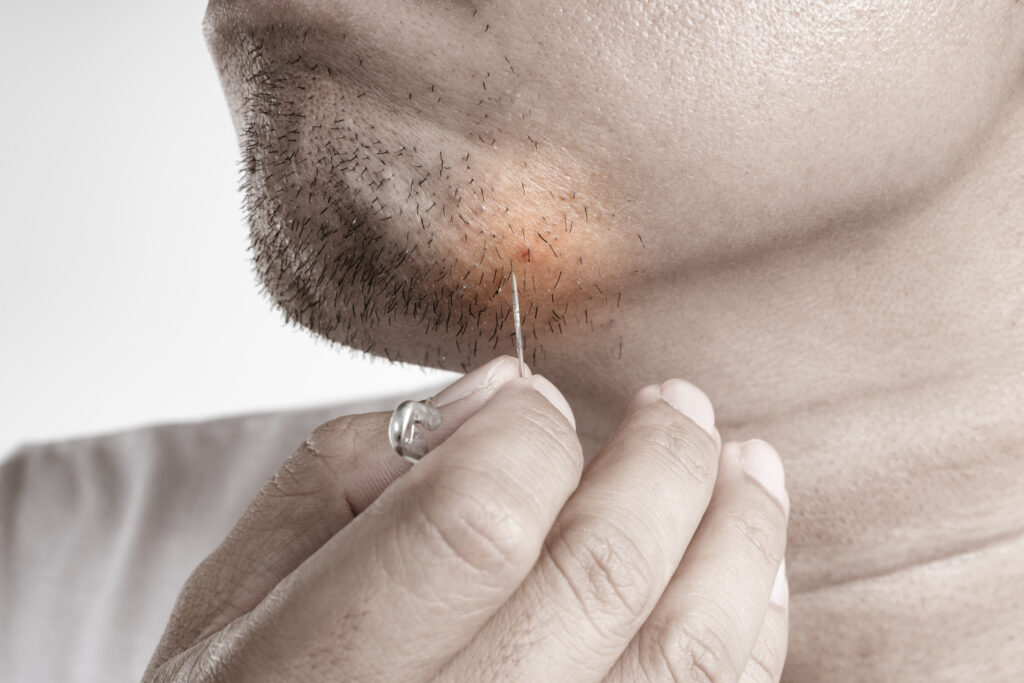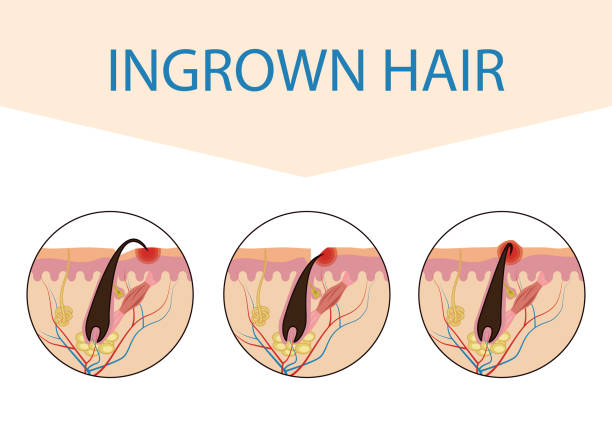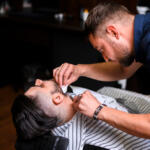
Are you bothered by stubborn ingrown hairs? Feel like they’re refusing to go away? You’re not alone. This blog post will give you a closer look at ingrown hairs, explaining what they are, how long they can stick around, and giving you tips for prevention and treatment. Let’s dive in!
Table Of Contents
−- Ingrown Hair 101: An Introduction
- Ingrown Hairs: The Causes
- Spotting an Ingrown Hair: Signs and Symptoms
- How Dangerous Are Ingrown Hairs?
- Keeping Ingrown Hairs at Bay: Prevention Tips
- Treating Ingrown Hairs: Your Options
- At-Home Remedies for Ingrown Hairs
- When Should You See a Doctor?
- Are There Long-Term Solutions for Ingrown Hairs?
- Wrapping Up: Handling Ingrown Hair Cysts
Ingrown Hair 101: An Introduction
An ingrown hair is hair that curls back or grows sideways into your skin. It might present as a small, red, itchy bump that could be filled with pus. Typically a consequence of shaving, waxing, or other hair removal methods, ingrown hairs can stick around for a few days to a number of weeks. Severity is a key factor here: mild cases often resolve themselves, while more severe cases might call for medical treatment. In the meantime, home remedies like warm compresses and exfoliating can help soothe symptoms and speed up recovery.
Ingrown Hairs: The Causes

Various factors can lead to a hair follicle growing back into the skin, rather than outwards. Hair removal methods like shaving, waxing, or tweezing often get the blame. But other culprits include dead skin cells that clog the follicle, tight clothing or jewelry rubbing against the skin, or even certain genetic factors. At times, infections can cause ingrown hairs too. With every hair removal or cut, there’s a potential for the hair to become ingrown due to the sharpness of the ends. But don’t worry – there are ways to minimize your chances of getting these uncomfortable bumps.
Spotting an Ingrown Hair: Signs and Symptoms
An ingrown hair typically appears as a small, darker bump on your skin. You might experience a burning sensation or itchiness. Sometimes, the hair can become trapped under the skin. More severe cases might involve an infection, leading to redness, swelling, and pain. These symptoms could linger for several days or even weeks if left untreated. However, many ingrown hairs resolve themselves without any intervention. Mild infections might also clear up within a few days, although more severe cases could require medical treatment.
How Dangerous Are Ingrown Hairs?
While ingrown hairs can certainly cause discomfort and pain, they are generally not dangerous. Left untreated, they could lead to an infection. However, most cases can be managed at home using simple remedies like warm compresses and over-the-counter medications. If the infection worsens or enters the bloodstream, seeking medical attention as soon as possible is crucial. In such cases, antibiotics might be necessary to clear up the infection. With proper care and treatment, ingrown hairs should not cause any long-term damage or health issues.
Keeping Ingrown Hairs at Bay: Prevention Tips
Preventing ingrown hair starts with reducing or stopping hair removal. If you must shave, use a sharp razor and move it in the direction of hair growth. Before you start shaving, apply a lubricating shaving cream or gel. Regular skin exfoliation with a wet washcloth or an exfoliating scrub helps to prevent dead skin cells from clogging your pores and trapping the hair. When shaving, avoid applying too much pressure, which can cause the razor blade to cut too close to the skin, increasing the chances of ingrown hair.
Treating Ingrown Hairs: Your Options
If you have ingrown hair, avoid further hair removal in the affected area until it clears up. In most cases, an ingrown hair will resolve itself without needing any treatment. Mild infections should clear up within a few days, but more severe ones might take longer. If you seek medical help, your doctor may prescribe antibiotics or other medications to reduce inflammation and promote healing. At-home treatments can be effective as well. Consider gently exfoliating the skin with a wet washcloth or using warm compresses to reduce inflammation. Remember to consult your doctor before trying any home treatments.
At-Home Remedies for Ingrown Hairs
Home remedies can be quite effective in treating ingrown hairs. Your options range from over-the-counter products to warm compresses, tweezing, and gentle exfoliation. Baking soda is a good exfoliant that can help prevent and reduce ingrown hairs. Oatmeal can soothe inflammation, while benzoyl peroxide, used in the shower or bath, can help heal the ingrown hair and prevent infection. Applying a warm, clean, wet washcloth to the affected area can also promote healing. However, remember that home remedies aren’t a replacement for medical treatment. Consult a doctor if symptoms persist.
When Should You See a Doctor?
If your ingrown hair doesn’t clear up within one to two weeks, or if the area around it becomes extremely painful, hot, red, or swollen, it’s time to seek medical attention. If you have a high temperature or feel very unwell, don’t delay your doctor’s visit. A medical professional can accurately diagnose the issue and provide appropriate treatment options.
Are There Long-Term Solutions for Ingrown Hairs?
If you’re frequently bothered by ingrown hairs, there are steps you can take to lower the risk of future occurrences. Using moisturizers or anti-inflammatory creams after shaving can help reduce the frequency of ingrown hairs. Regular exfoliation or using a sharp razor blade can also help prevent these uncomfortable bumps. If you’re still struggling with ingrown hairs despite these preventive measures, you may want to consider seeing a doctor for more permanent solutions.
Wrapping Up: Handling Ingrown Hair Cysts
Ingrown hairs can indeed be a pesky issue, causing discomfort and annoyance. However, they usually clear up on their own within a few days, especially with the right preventive and treatment measures in place. Both home remedies and medical treatments can help ease the discomfort and expedite the healing process. If you have any concerns or queries about your ingrown hair, never hesitate to seek advice from a qualified healthcare professional. With the right care, you can effectively minimize the risk of ingrown hairs turning into a long-term problem.
Last update on 2024-04-26 / Affiliate links / Images from Amazon Product Advertising API
Affiliate Disclosure: This post contains affiliate links, which means I may receive a small commission, at no extra cost to you, if you make a purchase using these links.

Jay Kang
Just because i'm asian does not mean I don't need shaving. I always wanted to grow a beard when I was young, now I need to shave because hair growth for me is a problem. I'm going through what every man will and has gone through before.





